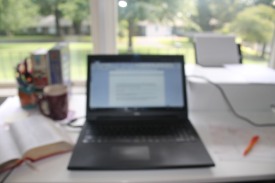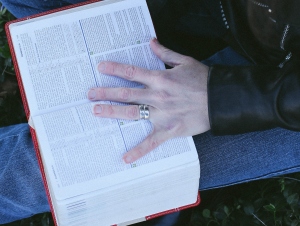I’m on my second walk through Psalms this year, something to which God called me before 2017 began. (Read more about that here.) If there’s one constant through the Psalms, it is worship. Every single Psalm, in one way or another, expresses worship to God.
Why is it, then, sometimes I don’t feel like worshiping?
- Sometimes serious things (personal or national/political) occupy my thoughts.
- Or someone has offended me.
- Or I’m sick.
- Or there are too many distractions.
- Or I’m a little angry with God because something didn’t turn out the way I thought it should.
You could probably had some other reasons.
It happens at church, too. Some mornings, I wonder why I’m even singing because my heart just isn’t in it and my mind won’t stay on it.
I’ve learned something, however, through reading the Psalms:
The call to worship is not contingent upon circumstances.
Because God never changes, our
call to worship never changes.
We worship God purely for Who He is. Because that never changes, our responsibility to worship never changes. The Psalms highlight the same attributes of God through troubles and triumphs, through fear and festival, through exile and exaltation.
Let’s get this out of the way first: One big thing that may inhibit our worship is unconfessed sin. If we’re holding onto something that blocks our relationship with God, we will find it hard to praise Him. Gotta take care of that.
But there’s another, more elusive inhibition. If worship leaves a bad taste in my mouth, perhaps it’s because my faith is focused on what He can do for me rather than Who He is.
In Psalm 54, David was in big trouble. He had been hiding from King Saul among the Ziphites, but they ratted him out. Now he was sure Saul was going to capture him and/or kill him.
Yeah, that would be distracting. If I knew someone was coming to kill me, I would wonder if God even cared. I would spend my quiet time plotting routes of escape and complaining to God about how I got into this situation in the first place. My gaze would be drawn to every fluttering leaf and every tiny sound. Without doubt, my circumstances would most certainly curtail my worship!
David starts out like that in Psalm 54 (not that he called it that). He tells God what’s going on (as if God didn’t already know) and pleads for God to help him. But then he stops. Right in the middle of the psalm, it’s as if he says, “Wait a minute! This is Yahweh God I’m talking to!”
Gut check.
David’s understanding of God’s
character informed his perspective
on God’s deliverance.
At this point (verse 4), the tone of the psalm shifts from cowardly to confident, from pleading to praise. Nothing has changed about his circumstances. David simply draws his faith focus back into Who God is rather than what God is doing in his life. When that happens, David’s understanding of God’s character (Who He is) informed his perspective on God’s deliverance (what He will do). He sees his circumstances through the lens of faith.

I wear glasses. Without them, I can’t drive, cook dinner, or even type on this computer. Would anyone say I see the world more accurately without my glasses? Of course not. When I see my surroundings through the lenses of my glasses, I see it for real—the way it is. Without them, everything is blurry and I can’t recognize people sitting across the room from me. In the same way, there is nothing artificial about viewing our circumstances through the lenses of faith. In fact, we receive a more accurate image of the world this way.
We fix our eyes not on what is seen, but on what is unseen, since what is seen is temporary, but what is unseen is eternal. -2 Corinthians 4:18
David finishes this psalm with a promise to God for the future. He is so confident in God’s deliverance that he plans to sacrifice an offering (Psalm 54:6-7). How could he do that in the middle of such drastic circumstances? Well, he refocused. That’s how worship works.
I have yet to find a psalm that says, “If you feel like it, worship God” or “When your circumstances are close to ideal, bring your praises through the gates.” Instead, I read things like…
Come, let us sing for joy to the Lord;
Let us shout aloud to the Rock of our salvation.
Let us come before him with thanksgiving
And extoll him with music and song. -Psalm 95:1-2
Or this:
It is good to praise the Lord
And make music to your name,
O Most High,
Proclaiming your love in the morning
And your faithfulness at night. -Psalm 92:1-2
The point of worship is to glorify God. When we begin to do that—when we open our mouths and orient our minds toward Him—our emotions (that “feel like it” issue) fade into the background. There’s a discipline to worship…I don’t have space to explore today. (Maybe another time?)
My perspective on my problem
changes as I remind myself of
God’s character and nature.
Is my previously-distracting problem still there? Sure. Will I still have to forgive that person who offended me? Absolutely. But my perspective on my “issues” changes as I remind myself of God’s character and nature, of His faithfulness in the past and provision for the future.
That’s what we do in authentic worship. We tell God Who He is and, in the process, remind ourselves of the same. We put on our faith glasses.
When we worship You we gain clear understanding, our lives are transformed, and we receive power to live Your way. -Stormie O’Martian, The Power of a Praying Wife
Since third grade, I have never woken up in the morning and failed to put on my glasses. I’ve never (permanently) lost a pair of glasses, and I’ve never said, “I don’t feel like wearing my glasses today.” I’ve never preferred the world to be fuzzy and impassable. But for some reason, I often choose to see my circumstances without the benefit of my faith lenses. That’s when my worship falters.
So if you feel like you can’t worship today, do it anyway. It’s like putting on your glasses. Your feelings will follow.
Do you sometimes have trouble worshipping? How does God meet you in that place? What has helped you in the past? You would bless all of us if you left a comment to let us know! Or you could tell us a funny story about your glasses. That would be good, too.

So good! True worship that pleases the Father is difficult, isn’t it? I love Psalm 13 for similar reasons you shared here. David is having a horrible, no good very bad day until he turns it around with, “But I trust in Your unfailing love for You have been good to me.” As for glasses, I get this. Can’t see a durn thing without them. — which brings me to a petty, selfish plea, friend – the yellow color you use to highlight key points is lovely, warm and inviting. but I can’t see it well even with my durn glasses. 😦 Love you!
LikeLiked by 1 person
Thank you for telling me that, Mary! I usually use it for Scripture, but I can easily find another, stronger color.
Oh, and thank you for commenting/encouraging. Sometimes we just have to stop our little prayer-rants and remind ourselves just Who we’re talking to.
LikeLike
Going with purple from now on
LikeLike
Carole, I really enjoyed reading this and you made some excellent points. God never changes and neither should our worship. Regardless of what is, or is not, He is always worthy of our worship — because of Who He is.
I also love how you used eyeglasses to illustrate your points; I’ve worn glasses since fourth grade and can totally relate!
Blessings to you and yours!
LikeLiked by 1 person
Thanks, Rashawnda. I actually didn’t think about the glasses angle until I was half-way through writing the post. And yes, it’s about Who He is, not how we feel.
LikeLiked by 1 person
Hi Carole, it’s funny you should say you never woke up wanting to do without your glasses. I did. I hated having to wear them. When I was in junior high, I decided I would just force my eyes to learn to see without them. I laid them aside for an entire summer to prove my point. When school was getting ready to start again, I gladly put them back on. The point I proved? That without them my eyes remained in a constant state of tired, my forehead hurt from squinting, and I could never see what I really wanted to see. Case closed on that experiment.
LikeLiked by 1 person
And isn’t that a great extension to my example? When we try to see the world on our own, we end up exhausted, hurting, and frustrated. Thanks for sharing!
LikeLiked by 1 person
As I read this, I thought of The Four Spiritual Laws, the little booklet Campus Crusade (CRU) used to (still does?) use for evangelism. It had an illustration of a train. The engine was FACT, the car was FAITH and the caboose was FEELING. First things first, right?
LikeLiked by 1 person
Absolutely! We often let our emotions dictate our actions. While emotions–in and of themselves–aren’t sinful, they can lead us to sinful thoughts and actions. That train is a great example.
LikeLike
I like your unassuming, personable style of writing, and I loved your message. I have often noted the Psalms starting out with problems and ending in praise. It’s always been inspiring to me. It’s so true that when we choose to worship, the feelings follow!
LikeLiked by 1 person
Thanks, Heather. Can I quote you on my writing style?
Yes, like so many important things, sometimes we have to act and let the feelings follow.
LikeLiked by 1 person
Of course you can quote me!
LikeLiked by 1 person
I enjoyed this very much, and I can totally relate – I must reach for my glasses first thing each morning, too.
You’ve made some very good points – I like “So if you feel like you can’t worship today, do it anyway. It’s like putting on your glasses. Your feelings will follow.” We don’t walk by feelings, we walk by faith. Just another way of saying it.
LikeLiked by 1 person
Thanks for stopping by! Yes, we walk by faith. I’m glad to meet another friend walking in the same direction!
LikeLike